Isolation Abuse represents a particularly insidious form of control or self-sabotage, where a person is subjected to separation or isolation. This can occur in various contexts, including familial relationships, romantic partnerships, workplaces, or even self-imposed isolation.

Isolation Abuse involves targeting a person or oneself by subjecting the individual to the condition of being separated, either physically, mentally, emotionally, or spiritually. This separation can be achieved through various means such as intimidation, manipulation, coercion, or the individual’s own fears and anxieties.
Identifiable Victim Markers (IVMs):
• Avoidance: A tendency to avoid social interactions, family gatherings, or even daily activities that would usually involve interaction with others.
• Compliance: A willingness to comply with isolating demands or expectations, often out of fear or a misguided sense of obligation.
• Conditioned Beliefs: The individual may have ingrained beliefs that lead to isolation, such as thinking that they are unworthy of social connections or that others are out to harm them.
• Detachment: Emotional detachment from others, leading to a sense of disconnection and loneliness.
• Dismissive: A dismissive attitude towards others’ attempts to connect or offer support, often stemming from mistrust or a distorted perception of relationships.
• Isolation: An obvious marker, physical or emotional isolation can become both a symptom and a tool of the abuse.
• Self-blame: The individual may blame themselves for their isolation, believing that it’s their fault for not fitting in or for being different.


